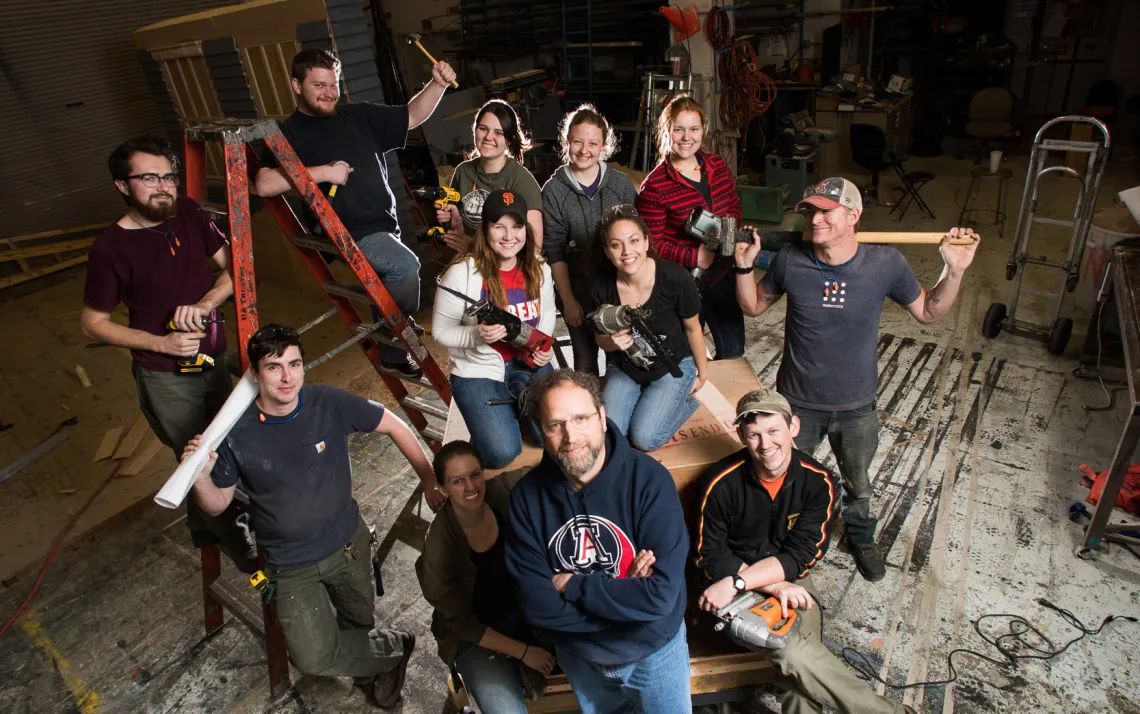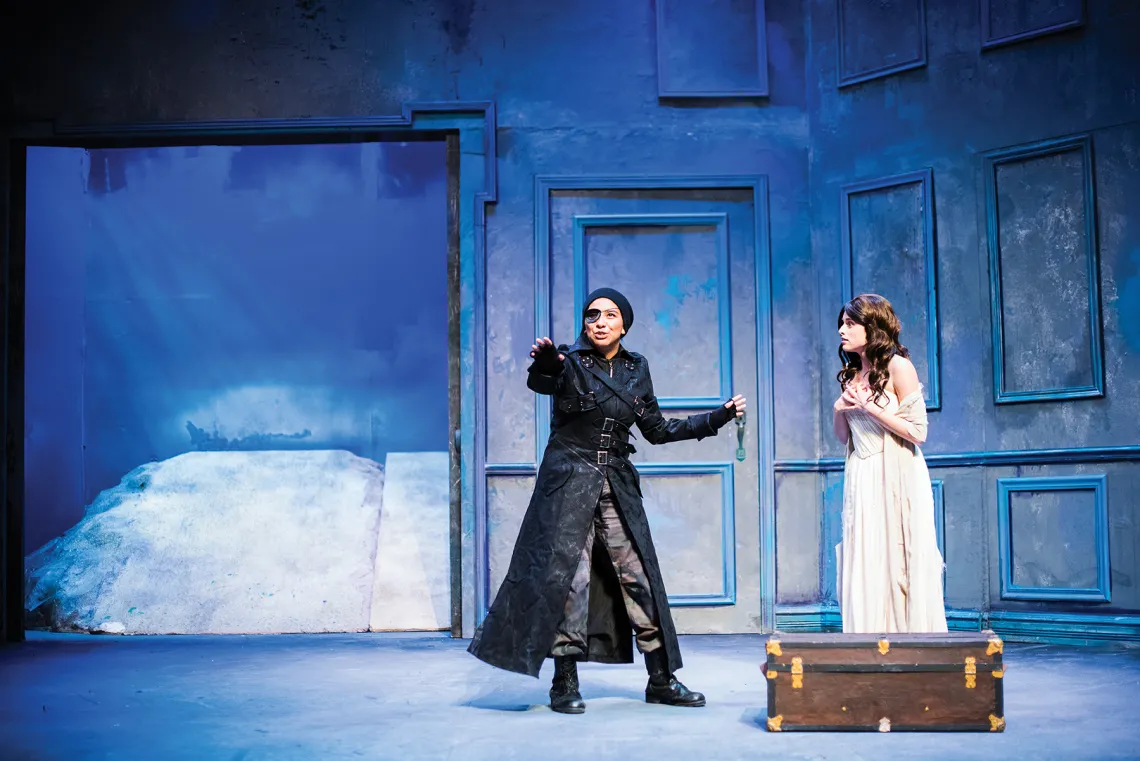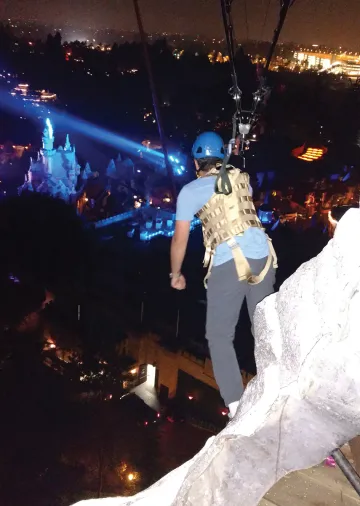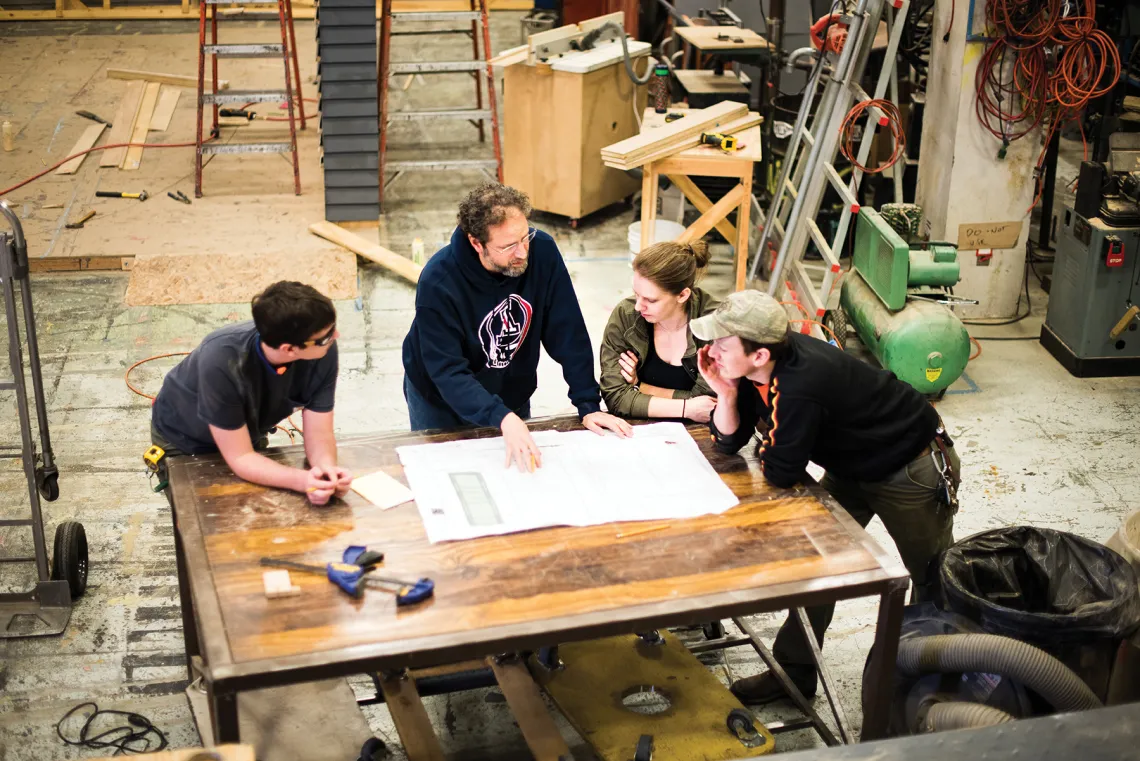Stage Magic
Disney and donors give theater students a technical edge

When her work goes unnoticed at Chicago Shakespeare Theater, Angela McMahon ’16 congratulates herself on a job well done.
As an assistant technical director, McMahon uses automated motors to switch out and move scenery in ways that appear seamless to the audience.
“It keeps you in the world of a play when you see one set just magically spinning to another,” she says. “You may not think much about it as an audience member, but you would if you saw people in black clothing running out and changing the set.”
During her final semester of coursework for her master’s in technical direction, McMahon took the University of Arizona’s first automation design class. “Theater is moving more and more toward automation. I knew I needed training,” she says.
In response to interest from students like McMahon, Assistant Professor and Technical Director Ted Kraus last year made the UA one of a handful of theater programs in the nation to teach automation design using the Tait Navigator software system.
“Navigator is cutting-edge technology. This is what rock ‘n’ roll shows and Broadway are using. It’s such amazing software,” says Kraus.
It’s also what Chicago Shakespeare Theater uses, and McMahon’s knowledge of Navigator helped her secure her job before graduating.
Kraus hopes to establish several more automation courses in partnership with industry experts. With help from a donor, he’s developing a relationship with The Walt Disney Co., an automation powerhouse and a dream workplace for many students in the program.

Jacob Chinn photo
“Twelfth Night,” presented by UA’s Arizona Repertory Theatre
“It’s incredibly exciting. We are on such a precipice of fundamentally changing the technical direction master’s program,” he says.

Disneyland Resort Controls Engineer Ryan Hunter tests the Tinker Bell flight rig from the Matterhorn at Disneyland Resort in California. Photo courtesy of Ryan Hunter.
Recent Disney retiree Louis Vrabel — a theater program donor, along with his husband Robert Grubbs ’82 ’89 — introduced Kraus to Ryan Hunter, whom he describes as an “automation genius.” Hunter, a controls engineer at Disneyland Resort, uses Navigator and formerly worked at Tait Towers, the company that produces the software.
Hunter helped Kraus design a curriculum around best practices, and this semester the two are co-teaching an automation course. Both instructors are confident that the coursework, a combination of Hunter’s practical knowledge and Kraus’ problem-based teaching approach, will lead to more alumni success stories like McMahon’s.
“If we educate according to what we expect in the industry, the students will have marketable degrees,” says Hunter.
Jack Meng, who will graduate from the master’s program in May, feels prepared to compete for a technical director position. He took the first automation class and is honing his skills in the current session. He’s also putting his knowledge to work as technical director for Arizona Repertory Theatre’s production of “Twelfth Night.” It’s his fourth time serving in this role at the UA.
“The UA does a good job of not keeping you in the classroom. I’m not just reading it in a book; I’m actually setting up automation systems. I feel like I have an edge in that respect,” he says.
Like Meng, every UA theater student graduates with experience gained through staging Arizona Repertory Theatre plays, says Kraus. He believes adding automation to the master’s program is another powerful way to prepare students for
careers in theater, which he calls a “living, growing art form.”
“It’s about broadening comfort zones, giving students the ability to integrate innovation into their processes,” he says.
When the theater program can embrace new technologies, says Bruce Brockman, director of the School of Theatre, Film and Television, he has alumni and donors to thank for it.

Graduate students Dan Movick (left), Jack Meng (far right) and Ruth Richardson review set design plans for “Twelfth Night” with Assistant Professor and Technical Director Ted Kraus.
“We have dedicated donors working on our behalf. They make a huge difference,” says Brockman. Vrabel and Grubbs, for example, recently made a planned gift to endow scholarships, reflecting a desire to build a legacy in their names and to help deserving students.
“I want to give students a chance to fulfill their dreams in the arts and entertainment industry, like I have. I’ve been extremely lucky to provide amazing entertainment to the world,” says Vrabel.
In addition to making gifts and the kinds of introductions Vrabel did, donors invite their friends to support the program. And their combined contributions position students and faculty to follow opportunity. Kraus trained to use Navigator with the support of the Theatre Fund for Excellence, and the Jane and Lee Kivel Guest Artist Endowment in Theatre Arts provided the funds to extend a teaching offer to Hunter.
